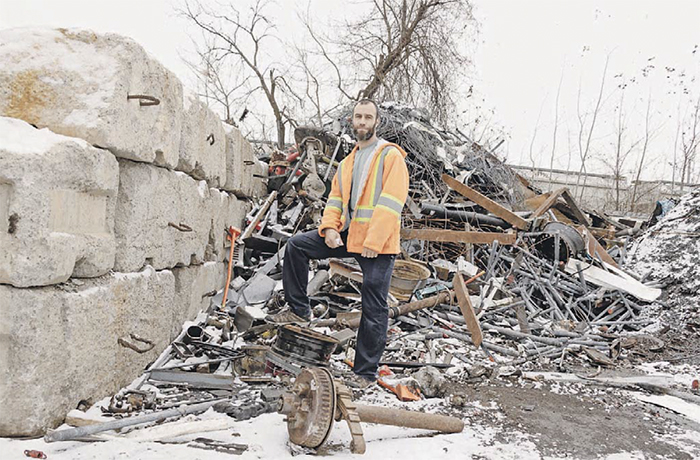Sous-total: $

Christmas trash is a garbage collector’s treasure
Toys, clothes, cellphones, even some nude photos from a Christmas party. The holiday season is always a memorable time for Simon Paré-Poupart and his fellow garbage collectors, when the mounds of waste they have to cart away grow bigger, when still usable items get discarded in the pursuit of Christmas consumerism.
People clean house before the celebrations. They dispose of unwanted gifts. They throw away devices being supplanted by newer models. It’s an opportunity for trash haulers like Mr. Paré-Poupart to keep some goodies for themselves, between dragging out bins and flicking garbage bags into their compactor trucks.
« I work less in winter now but during the holiday season, I do it full-time. I specifically ask to be assigned because it’s a moment when people are all caught up with consuming, » he said in an interview from his home in Sainte-Thérèse, north of Montreal.
The 39-year-old works for a subcontractor of the waste management company Environmental 360 Solutions.
He has written a book about his two decades picking up rubbish for an array of companies, in and around Montreal, an eyewitness to our society’s conflicted attitude toward its domestic waste. Released this fall, Ordures! Journal d’un vidangeur (Garbage! Diary of a Trash Collector) gives readers a peek into an occupation that’s essential but often taken for granted and met with disdain.
« Day after day, I collect the residue of the most polluting civilization in the history of humankind, » he writes.
In his interview, he noted that, despite the emergence of recycling and composting, much of the population remains careless about garbage, having been conditioned by years of effortless removal – bagged and whisked away, our cast-offs are made invisible. « It allowed us to not worry about it, not being in contact with our waste. »
His job is fitting for someone who grew up reading Emile Zola’s novels about the coal miners, roofers and washerwomen of 19th-century France.
Bookish and a fan of Dungeons & Dragons, he was 18 when his stepfather challenged him to « man up. » He responded by applying for a job at a local waste disposal company, noticing the foul-smelling truck, the grimy men and the clouds of flies as he walked into their yard with his resume.
On his first day, being the new guy, he was handed the least desirable task, jumping into the bed of a pickup to shovel trash into a compactor. Under his feet, it was squishy, stinky and crawling with maggots that wiggled up his legs.
Some never return after their first shift, not even to collect their pay. Mr. Paré-Poupart, however, kept coming back. He got used to the stench and the wages took care of the tuition fees for his bachelor’s degree in psychology and sociology, and a master’s in international administration.
At the nudging of his thesis supervisor, he became an author. The book is the kind of non-fiction where an industry is demystified by an insider with an eye for details and a way with words. He takes the same behind-the-scenes approach as Ben Hamper chronicling life on the General Motors assembly lines in Rivethead, or Anthony Bourdain laying bare the mayhem of Manhattan’s restaurants in Kitchen Confidential.
The first chapter opens with Mr. Paré-Poupart cursing at 18 bulging bags of renovation waste waiting for him on a sidewalk. The inconsiderate homeowner peers from behind a window curtain, not deigning to make eye contact.
The book explains the clues cranky garbage crews leave behind. If your trash container was thrown back into a particularly inconvenient spot, it could be because you left the lid open and they found it full of rainwater mixed with dog turds. « Dropped in the middle of your tulips, your bin is expressing my anger. »
His co-workers are a picaresque bunch of former prisoners and recovering drug users – one just bolts at the sight of a passing police car. They’re employed by a patchwork of brokers and subcontractors. A verdant town is in fact a backbreaking assignment because of the heavy landscaping waste. It’s brutal work, running after the truck during heatwaves, wrangling bins through snowbanks and icy pavement in winter, hauling at arm’s length dripping bags and nail-studded lumber.
Years of seeing waste made Mr. Paré-Poupart an avid scavenger. He drives his pickup around the bedroom communities north of Montreal, checking out the curbside leavings. He furnished his house from dumpsters. He resells scrap metal, sharing the profit with charities. He’s a steady source of toys for his two young children and the neighbourhood kids. « Does my father-in-law need an icebox? » he writes, « Two weeks later, I have three for him to choose from. »
The festive season is a particularly good time for such foraging. He can identify what’s being cast off because bags are tied loosely, or they burst open when crushed by the compactor. He can tell by the touch when a sack is full of clothes.
Those Christmas office party nudes? They were amateur shots thrown away in the suburb of Laval, Que. « We’re invisible to people. They think their garbage just disappears in the snow, that no one will get their hands on it. »
Another notable juncture is the end of the university terms in Montreal’s Milton-Parc, a neighbourhood of out-of-province student renters who jettison piles of assorted junk when they leave town – furniture, board games, unopened booze. Additional garbage crews have to be dispatched. The homeless know about this too and they rush in to rip bags open ahead of the trucks. « It gets messy pretty fast, » he said.
Mr. Paré-Poupart has been a Red Cross co-ordinator, an outreach worker, a contributor to an alternative paper. But he still works the trash runs. He enjoys doing manual labour, rubbing shoulders with colourful characters, being free from social norms. « Not only do I love it, it’s a passion. »
In the beginning, his co-workers nicknamed him Psycho, because he had studied psychology. Now, they call him L’écrivain – The Writer.
Tu Thanh Ha, The Globe and Mail, 24 décembre 2024
Photo: Boris R. Thebia / The Globe and Mail
 Mon compte
Mon compte





